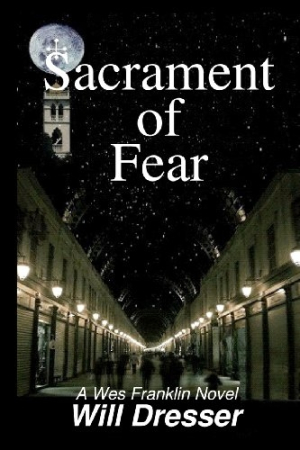Sacrament of Fear
In different parts of the world, at close to the same time, members of the secretive and benevolent Cloister of Akhenaten are suddenly dying of what at first seem to be natural causes. As the death count rises, surviving members and their associates identify a pattern and come together to seek the truth, in order to prevent further deaths.
Central to the story in Sacrament of Fear is Wes Franklin, a former child prodigy with several impressive degrees and a proclivity to accept nearly every dangerous challenge that comes his way. When he receives word of the mysterious death of a friend who shared membership in the Cloister of Akhenaten, Wes travels to the Netherlands to pay his respects and assist in the investigations. What follows is a compelling tale of a particularly nefarious terrorist plan, which initially appears to be centered on the Cloister but soon reveals itself to be casting a much larger net of potential terror.
The book is constructed skillfully from its intriguing opening to its satisfying conclusion, and the pace of the action ebbs and flows effectively. Wes Franklin is the type of hero who would translate quite easily from book to film, as would his enigmatic friend and bodyguard, Rouzbeh Aryana. Readers will be pleased with the thorough depictions of other characters as well, as even the most transient are given enough depth to be credible. The main villain of the story is well drawn, and his plan for “customized terror” is especially malevolent, involving a substance which will cause each victim to “suffer his or her own personal hell.” Dresser also draws a particularly effective parallel between two young men involved in the situation whose ultimate and very different choices have lasting consequences neither could have anticipated.
The author’s extensive research is evident in his attention to detail. From geographical locations to concepts revolving around terrorism, chemical warfare, and religious extremism, Dresser provides enough information to explain and support the plot without causing the reader to become lost in the verbiage.
A tendency to italicize certain references and capitalize every letter in the names of places and groups proves distracting, as does the abundance of exclamation points. This excessive punctuation detracts from otherwise smooth and credible dialogue, and it betrays a novice authorial view of the need to emphasize rather than trust readers to extract the intended tone from the story itself.
Sacrament of Fear is the first in a trilogy of novels featuring Wes Franklin, and the author maintains a comprehensive website, which includes in-depth character background and plot synopsis, to complement the series. Despite the minor missteps, Sacrament of Fear is a compelling and enjoyable read, certain to leave readers eagerly awaiting the next book.
Reviewed by
Jeannine Chartier Hanscom
Disclosure: This article is not an endorsement, but a review. The publisher of this book provided free copies of the book and paid a small fee to have their book reviewed by a professional reviewer. Foreword Reviews and Clarion Reviews make no guarantee that the publisher will receive a positive review. Foreword Magazine, Inc. is disclosing this in accordance with the Federal Trade Commission’s 16 CFR, Part 255.

